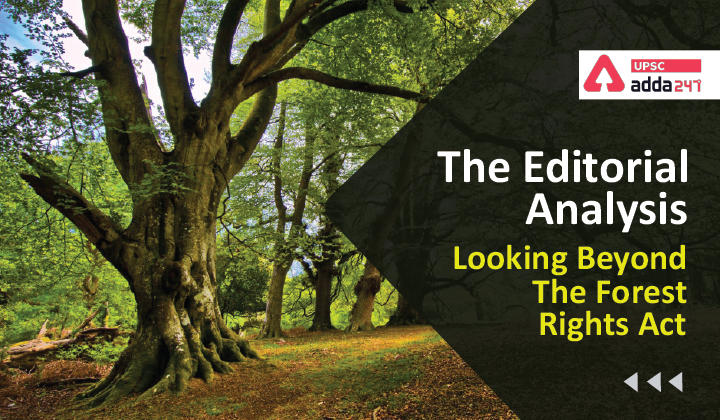Table of Contents
Forest Rights Act: Relevance
- GS 2: Government policies and interventions for development in various sectors and issues arising out of their design and implementation.
Forest Rights Act: Context
- As on April 2020, the Ministry of Tribal Affairs has distributed forest-land claims to 46% of the applicants. However, the supporters of tribal rights allege that the Forest Department has overlooked the genuine claims of the tribal people.
What is Forest Rights Act?
- The Scheduled Tribes and Other Traditional Forest Dwellers (Recognition of Forest Rights) Act, 2006, was enacted to protect the marginalised socio-economic class of citizens and balance the right to environment with their right to life and livelihood.
Forest Rights Act: Issues in implementation
- Bypassing Gram Sabha: The Act provides for the constitution of a Forest Rights Committee comprising members from within the village by conducting a Gram Sabha with two-thirds of the members present at the meeting. These committees were mostly constituted by the Panchayat Secretaries upon the directives received from District Magistrates at short notice, bypassing the Gram Sabha.
- Nominated members: The nominations for members for the taluk-level and district-level committees were also not transparent.
- Subjugation of women: FRA provides for equal rights in titles issued under the Act for women. However, at the ground-level, the implementation of this provision is far from reality.
- Ignorance of admissible proofs: In the initial stages of implementation, there was insistence on satellite images as evidence while other admissible proofs were ignored. It has resulted in mass rejections of claims by the authorities.
- Poor awareness: Poor awareness levels among the tribal people about the Act has also affected their decision to place their claim effectively. For example, in some villages in Chhattisgarh, the extent of land that was awarded was far smaller than what was claimed within the ceiling. The claimants did not protest anticipating that whatever little they had received could be taken back by the authorities.
Issues in tribal areas
- A majority of the tribal communities in India are poor and landless.
- Tribals are witnessing a decline in the quality of forest produce. Moreover, influx of labourers from Bihar, who were willing to work for low wages, has led to reduced earnings of tribals.
- Lands with the tribals, including the lands recognised under the FRA, are not very fertile. Moreover, lack of irrigation facilities forces them to depend only on rainfall.
- To enhance their income, they migrate to work as construction or road-laying labourers.
Improving life of tribals: Steps taken by the Government
- Click here to read about this in detail.
Way forward
- Focus on horticulture: Livelihoods of the locals would improve if horticulture practices are promoted in addition to bamboo and aloe vera plantations with an assured market.
- Ecotourism: Medical and ecotourism, along the lines of the Kerala model, could also increase the tribal income, and help address the cause of tribal poverty.
- Skill-based education: Providing skill-based education with assured jobs would do wonders in these areas.
- Proper implementation of schemes and Acts: To improve the condition of the tribal people, the already available schemes like Tribes India Outlet and Acts like FRA and the Panchayats (Extension to Scheduled Areas) Act, 1996 should be properly implemented.
Also Read:





 TSPSC Group 1 Question Paper 2024, Downl...
TSPSC Group 1 Question Paper 2024, Downl...
 TSPSC Group 1 Answer key 2024 Out, Downl...
TSPSC Group 1 Answer key 2024 Out, Downl...
 UPSC Prelims 2024 Question Paper, Downlo...
UPSC Prelims 2024 Question Paper, Downlo...
